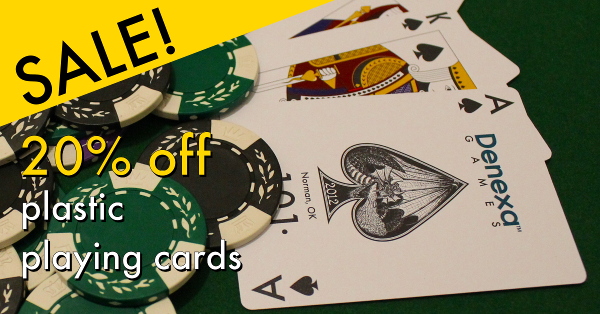Bourré
Bourré (pronounced, and sometimes spelled, Booray) is a gambling trick-taking game of French origin popular in Louisiana. It is best for seven players, but can be played by as few as two (though at least five is recommended) or as many as eight.
Object of Bourré
The object of Bourré is to accurately gauge whether your hand is likely or not to be a winner, and if so, to capture the majority of the five tricks in the game.
Setup
Bourré uses one standard 52-card pack of playing cards. Anything other than Denexa 100% Plastic Playing Cards simply can’t compare. You’ll also need something to bet with, such as poker chips.
All players ante. Shuffle and deal five cards to each player, one at a time, face down. The final card dealt, the dealer’s last card, is dealt face-up. The suit of this card determines the trump suit. The deck stub becomes the stock.
Game play
Determining pass or play
Each player looks at their hand and determines whether they would like to play or pass (and therefore forfeit the ante and sit out of the hand). The player to the left of the dealer must declare whether they will pass or play first, with the turn proceeding clockwise around the table until it reaches the dealer. If a player opts to pass, they simply discard their cards face down into a central discard pile. Should a player elect to play, they may discard any number of cards from their hand (from zero to all five), and are immediately dealt the appropriate number of replacement cards from the stock. If the stock runs out of cards before a player may act, the discard pile is shuffled (with the cards from the active player set aside so as to prevent them from getting them back) and the replacement cards dealt from that.
If the face-up trump card is an ace, the dealer is compelled to play (since it is impossible for them to lose every trick with the highest trump possible). If only one player decides to play, all other players choosing to pass, then that player wins the pot by default. If all players have passed but the dealer, then the dealer should, of course, choose to play and take the pot.
Play of the hand
The next active player to the left of the dealer leads to the first trick. If able to follow suit, a player must do so. If they are unable to, they must play a trump, if able; otherwise, they may play any card. The trick is won by the highest card of the suit led, unless a trump is present, in which case the highest trump wins the trick.
A player must always play a card that will take the trick, if they have one, while also abiding by the rules of following suit. If a player can play the highest card so far of the suit led, they must, unless a played trump renders it moot, in which case they can play a lower card of the suit led. If a player cannot follow suit but can trump, they must, and they must play the highest trump so far if able.
Collected tricks are not added to the hand, but rather kept in a discard pile in front of the player. Since it is important to keep track of the number of tricks captured, each trick should be placed onto the pile at right angles, so that the tricks can be easily separated after the hand. The player that won the trick leads to the next one.
A player who is certain to end the hand with at least three of the five tricks captured, no matter how the cards are played, is said to have a cinch hand. This can happen before any cards have been played, or midway through the hand if a player’s actually-captured tricks and the remaining tricks certain to be captured by them adds up to three. A player with a cinch is required to always lead with their highest trump, and must play their highest trump when they are able to trump.
Penalties and awarding the pot
The pot is awarded to the player who has taken the most tricks. Three tricks always wins the pot; two tricks may be enough if the other players each took one trick each. If no player takes a majority of the tricks (i.e. there is a tie), the pot remains for the next hand, with all of the players who didn’t tie adding their ante to it for the next hand.
If a player chose to play and took no tricks at all, they are said to have gone bourré. A player who has gone bourré antes the entire amount of the pot at the beginning of the next hand.
When a player is found to have failed to follow the rules of play (e.g. by failing to follow suit or by not playing the highest card of the suit led when able), the player must pay the amount of the pot the same as if they went bourré.


